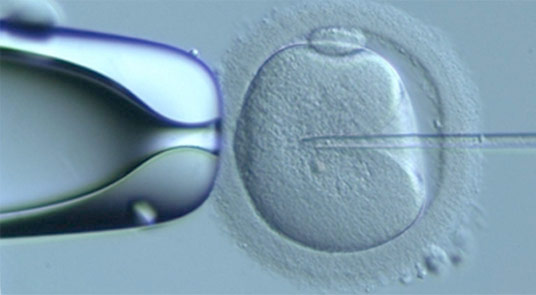What does IVF mean?
Step by step IVF process
Your treatment will be coordinated by your fertility specialist, who will have the support of an experienced team of nurses, counsellors, and embryologists. We understand how important a family having is to you. You can be assured that we will provide you with the highest standard of fertility care.
Here is what you can expect to happen when going through IVF.
Step 1: Initial specialist appointment
At your first appointment, your Fertility Specialist will review your medical history, carry out the following tests and start to advise you about your treatment options.
- Blood tests: These include antenatal screening, anti-Mullerian hormone (AMH), hormone profile (pituitary, ovarian and thyroid) and karyotype (chromosome - genetic material - check) to make sure you have the right number of chromosomes and that they are in the right order.
- Pelvic ultrasound: To get an idea of the structure of the pelvis, the uterus and how it looks, the ovaries and how they are positioned, and if there are any problems that need further investigation.
- Semen analysis: If your male partner is present, he'll have a semen analysis to make sure there are enough good quality sperm. They will look at the shape, size, number, and movement of the sperm.
Step 2: Consultation prior to treatment
After your initial appointment, you'll usually see your fertility specialist again for a follow-up appointment to discuss your results. Your doctor will use these results to help decide what's best for you and how best to proceed.
Your doctor will give you the medication you need, explain the treatment cycle and show you how to administer your own FSH (follicle stimulating hormone) injections. We recommend that both you and your partner attend this appointment.
Step 3: Start of the treatment
There are several types of ovarian stimulation for IVF treatment. The most used protocol is the antagonist protocol, the timing of which is explained in more detail below.
The first day of IVF treatment is the first day of your menstrual cycle. As soon as you start your period, you'll need to call the nurses to let them know about it. Hormone stimulation will usually start on day 2.
Step 4: Hormone stimulation
You will give yourself these injections using a diabetic pen. The aim is to stimulate your ovaries to produce more eggs than usual. You will return to your clinic after five days to see how your body has responded to the injections. This is to avoid under- or over-stimulating your ovaries. The more eggs we can retrieve, the more likely we are to achieve fertilizations and a pregnancy.
Step 5: Monitoring treatment
If you're doing well with your FSH injections, you'll have a follow-up scan and blood test to check that your body is going in the right direction (stimulated) for your IVF cycle. This will also help us to determine the most appropriate time to collect the eggs. All your blood tests and ultrasound scans will be carried out by your doctor at our clinic. They are included in the cost of your treatment.
Step 6: Trigger injection
As soon as you have the optimal number and size of follicles, we will schedule you for egg retrieval. You'll be given a trigger injection of hCG (human chorionic gonadotropin) in the evening. The egg retrieval procedure will take place 36 to 38 hours later. The hCG injection replaces the body's natural luteinizing hormone. It triggers ovulation, so that the eggs mature and are ready for retrieval.
Step 7: Egg collection
Two days later, you'll come in for day surgery to get the eggs retrieved (this is the only day you'll need to take off work during your IVF cycle). The procedure takes about 20-30 minutes. You will be fully asleep while your fertility doctor uses a thin needle through the wall of your vagina to retrieve the follicles, guided by an ultrasound. You will be told the number of eggs retrieved when you have recovered from the procedure.
Step 8: fertilization of the eggs
Following egg collection, your eggs are immediately taken to the laboratory where they are combined with your partner's sperm and then fertilized. Fertilization will be carried out using Intracytoplasmic Sperm Injection (ICSI). This involves inserting one sperm into each egg.
You will usually receive a call from the laboratory with an update after the eggs and sperm have been tested.
Step 9: Development of the embryo
The next day, embryologist examine the eggs to see if fertilization occurred. We usually grow embryos in the lab up to day 5, known as the blastocyst stage. This is because there is strong evidence that these embryos are more likely to implant in the uterus.
Step 10: Embryo transfer
Embryo transfer is a simple day surgery procedure, usually performed five days after egg retrieval. The highest quality embryo is transferred into the uterus through a very fine catheter inserted through the cervix, a procedure like cervical screening. In some cases, we may recommend an earlier embryo transfer.
Step 11: Pregnancy test
We’ll arrange for you to have a blood test two weeks after the embryo transfer. Occasionally, women can still have a period despite being pregnant, so this blood test will be done even if your period has started. We do not recommend that you use a urine pregnancy test kit. This could give a false result.
We will arrange an ultrasound scan about three weeks later if the pregnancy test is positive.

Are you ready to start your IVF journey?
Start your journey with us by requesting an appointment with our leading fertility specialist. Initial consultations can be face-to-face or online, depending on what works best for you.
Call us on +905550526458 to find out more about getting started or fill in the form below. We are committed to supporting you throughout your journey and can help with any questions you may have.



